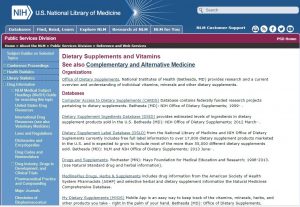Oct
17

Posted by Susan Halpin on October 17th, 2017
Posted in: Blog, NLM Resources, Public Health
Tags: diet pills, eating disorder, HB1195, supplements
Did you know that an estimated 300,000 Massachusetts residents suffer from an eating disorder? This week Massachusetts lawmakers will consider steps to prevent those under 18 years old from having access diet pills and weight-loss supplements. Massachusetts State Representative Kay Khan along with three organizations working to help those with eating disorders, STRIPED (Strategic Training Initiative for the Prevention of Eating Disorders), MEDA (Muli-Service Eating Disorder Association of America), and NEDA (National Eating Disorder Association) have joined together to promote house bill HB1195 which aims to address the dangers of diet pills and muscle-building supplements. Proponents of HB1195 are urging lawmakers to pass a bill requiring anyone purchasing these pills and supplements be at least 18 years old. The bill also includes a provision that they must be placed behind the counter in the stores where they are sold.
According to the National Institutes of Health approximately 15% of U.S. adults have used a weight loss supplement at some point in their lives. Currently, diet pills and supplements are not regulated like other medications that have to prove that they are safe and effective before they are allowed to be sold. Many who use diet pills may wrongly assume that they safe to use because they are widely available and can be purchased by the general public. The truth is that these over-the-counter medications have been found to contain illegal and even banned substances. Doctors like those at Cambridge Health Alliance (CHA) have been studying the effects of diet pills. Dr. Elisabeth Poorman of the CHA recently remarked, “A lot of weight-loss supplements include a drug called sibutramine, which in the past has been used for weight loss, but was very quickly pulled from the market because it is associated with heart attacks and strokes.”
In a recently-aired interview on Boston’s WGBH public broadcasting station, reporter Tina Martin talks to Kristy McMillan of Watertown, Massachusetts about the traumatic effect diet pills had on her health. “I struggled with an eating disorder for 21 years, using diet pills off and on during that whole time. I started when I was 15.” In college, Kristy started to experience abnormal heart tests and heart palpitations that she now attributes to her eating disorder and the use of diet pills. When Kristy received help for the eating disorder and stopped using the pills, she thought she was OK because her health seemed to return to normal. However, Kristy learned that she had heart damage after the miscarriage of her first pregnancy. Doctors discovered that her heart was not strong enough to carry a pregnancy. Since then Kristy has been advised that she should not get pregnant again. Through telling her painful and life altering story in such a public way, Kristy is sharing what she has learned about the dangers of using diet pills and supplements in the hopes of helping other women.
The Natural Products Association is opposing this legislation. The association president will be in Boston when lawmakers consider this bill on October 17th. The Natural Products Association issued a statement that said in part:
“This proposal would place onerous restrictions, most notably on small businesses. Dietary supplements are simply natural ingredients found in foods, and restricting access to them is unfair to Massachusetts consumers, hurts responsible retailers and drains the state budget through lost sales taxes. Nobody wins.”
Another important piece of HB1195 is that diet pills and supplements would be required to carry a warning label on the package, in addition to having them placed behind the counter. Kristy McMillan believes these types of restrictions would have helped her if they had been in place with she was a teen.
The National Library of Medicine has several educational resources that provide information about what is in dietary supplements. The Dietary Supplement Database from the National Library of Medicine and NIH Office of Dietary Suplements currently includes free full label information to over 17,000 dietary supplement products marketed in the U.S. and is expected to grow to include most of the more than 55,000 different dietary supplements. Here is the link to that database: https://dsld.nlm.nih.gov/
This screen capture shows additional NLM resources that can help you learn more about over-the-counter pills and supplements:

If you would like to listen to this story, click on the link to the WGBH interview by Tina Martin.